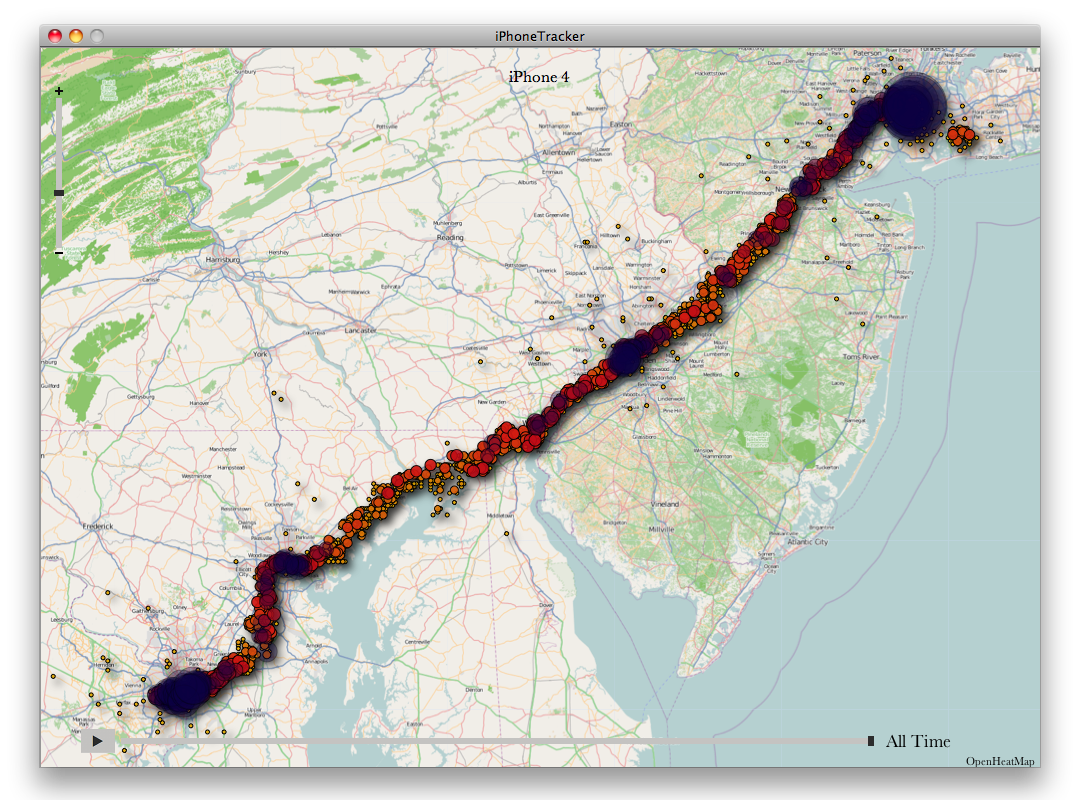Apple Dismisses iPhone Tracking But Will Fix It
Nothing but a few bugs, claims Apple.

Last week, word came out that the iPhone and iPad since iOS 4 have been logging location data and storing it in an unencrypted file that can be read to see where the device has traveled. The company came under much scrutiny and is now the target of lawsuits in the United States.
Apple has finally spoken and issued an official statement via press release in a Q&A format. The main takeaways are:
- Apple is brushing off much of its oversight and irresponsibility but is still going to make things right through upcoming software updates.
- The first will chop the amount of location stored from forever down to seven days.
- The next update will encrypt the file so that it's unreadable by anyone other than Apple.
- Apple is gathering the data to make its own traffic service.
Check it out in its entirety below:
Apple Q&A on Location Data
CUPERTINO, Calif.--(BUSINESS WIRE)--Apple would like to respond to the questions we have recently received about the gathering and use of location information by our devices.
1. Why is Apple tracking the location of my iPhone?
Apple is not tracking the location of your iPhone. Apple has never done so and has no plans to ever do so.
2. Then why is everyone so concerned about this?
Providing mobile users with fast and accurate location information while preserving their security and privacy has raised some very complex technical issues which are hard to communicate in a soundbite. Users are confused, partly because the creators of this new technology (including Apple) have not provided enough education about these issues to date.
3. Why is my iPhone logging my location?
The iPhone is not logging your location. Rather, it's maintaining a database of Wi-Fi hotspots and cell towers around your current location, some of which may be located more than one hundred miles away from your iPhone, to help your iPhone rapidly and accurately calculate its location when requested. Calculating a phone's location using just GPS satellite data can take up to several minutes. iPhone can reduce this time to just a few seconds by using Wi-Fi hotspot and cell tower data to quickly find GPS satellites, and even triangulate its location using just Wi-Fi hotspot and cell tower data when GPS is not available (such as indoors or in basements). These calculations are performed live on the iPhone using a crowd-sourced database of Wi-Fi hotspot and cell tower data that is generated by tens of millions of iPhones sending the geo-tagged locations of nearby Wi-Fi hotspots and cell towers in an anonymous and encrypted form to Apple.
4. Is this crowd-sourced database stored on the iPhone?
The entire crowd-sourced database is too big to store on an iPhone, so we download an appropriate subset (cache) onto each iPhone. This cache is protected but not encrypted, and is backed up in iTunes whenever you back up your iPhone. The backup is encrypted or not, depending on the user settings in iTunes. The location data that researchers are seeing on the iPhone is not the past or present location of the iPhone, but rather the locations of Wi-Fi hotspots and cell towers surrounding the iPhone's location, which can be more than one hundred miles away from the iPhone. We plan to cease backing up this cache in a software update coming soon (see Software Update section below).
5. Can Apple locate me based on my geo-tagged Wi-Fi hotspot and cell tower data?
No. This data is sent to Apple in an anonymous and encrypted form. Apple cannot identify the source of this data.
6. People have identified up to a year's worth of location data being stored on the iPhone. Why does my iPhone need so much data in order to assist it in finding my location today?
This data is not the iPhone's location data-it is a subset (cache) of the crowd-sourced Wi-Fi hotspot and cell tower database which is downloaded from Apple into the iPhone to assist the iPhone in rapidly and accurately calculating location. The reason the iPhone stores so much data is a bug we uncovered and plan to fix shortly (see Software Update section below). We don't think the iPhone needs to store more than seven days of this data.
7. When I turn off Location Services, why does my iPhone sometimes continue updating its Wi-Fi and cell tower data from Apple's crowd-sourced database?
It shouldn't. This is a bug, which we plan to fix shortly (see Software Update section below).
8. What other location data is Apple collecting from the iPhone besides crowd-sourced Wi-Fi hotspot and cell tower data?
Apple is now collecting anonymous traffic data to build a crowd-sourced traffic database with the goal of providing iPhone users an improved traffic service in the next couple of years.
9. Does Apple currently provide any data collected from iPhones to third parties?
We provide anonymous crash logs from users that have opted in to third-party developers to help them debug their apps. Our iAds advertising system can use location as a factor in targeting ads. Location is not shared with any third party or ad unless the user explicitly approves giving the current location to the current ad (for example, to request the ad locate the Target store nearest them).
10. Does Apple believe that personal information security and privacy are important?
Yes, we strongly do. For example, iPhone was the first to ask users to give their permission for each and every app that wanted to use location. Apple will continue to be one of the leaders in strengthening personal information security and privacy.
Software Update
Sometime in the next few weeks Apple will release a free iOS software update that:
reduces the size of the crowd-sourced Wi-Fi hotspot and cell tower database cached on the iPhone, ceases backing up this cache, and deletes this cache entirely when Location Services is turned off.
In the next major iOS software release the cache will also be encrypted on the iPhone.
Sign up to get the BEST of Tom's Guide direct to your inbox.
Get instant access to breaking news, the hottest reviews, great deals and helpful tips.
Marcus Yam is a technology evangelist for Intel Corporation, the latest in a long line of tech-focused roles spanning a more than 20-year career in the industry. As Executive Editor, News on Tom's Guide and Tom's Hardware, Marcus was responsible for shaping the sites' news output, and he also spent a period as Editor of Outdoors & Sports at Digital Trends.
-
tranzz 2. Then why is everyone so concerned about this?Reply
Users are confused, ...
They bought apple products, of course they are confused :) -
ubercake Uh... We didn't do it... Honest... But we're doing everything in our power to fix it...Reply -
ubercake I guess apple is maybe tracking my behavior. But I guess that's kind of like putting all my info on facebook, right? I guess I don't really care, because with apple, the real payoff is when I can walk into a crowded room and pull out a device people know I dropped $500-$800 on. They are so impressed with me. Whatever.Reply -
tranzz2. Then why is everyone so concerned about this?Users are confused, ...They bought apple products, of course they are confusedReply
Did you just... like... jump out of bed, log onto Tomshardware and find the first Apple related news story to troll? I mean, I'm guessing it must be one of those '5 a day' sort of things you people have to achieve, like fruit and veg? -
tranzz Did you just... like... jump out of bed, log onto Tomshardware and find the first Apple related news story to troll? I mean, I'm guessing it must be one of those '5 a day' sort of things you people have to achieve, like fruit and veg?Reply
It's not a dig at apple users. I can't believe a company could refer to peoples concers as "confused". Confusion is the inablity to put information togeter in a coherent manner. Musunderstanding would have been a more sensible word.
Confused:–verb (used with object), -fused, -fus·ing. :to fail to distinguish between; associate by mistake; -
filthyoptimizer ReplyThe iPhone is not logging your location. Rather, it's maintaining a database of Wi-Fi hotspots and cell towers around your current location...
I've got to remember that one next time I go to court for stalking. "Your honor, I wasn't logging her location. I was just maintaining a databases of things near her current location."
I own an iPhone and I don't care who you are or what product you prefer, this should be hilarious. It's not really the fact that they were security boneheads and had a privacy hole in their system. That's bad but nobody's perfect and other phones are suspected to have similar problems. It's the ridiculous denial of an obvious problem or shortcoming. -
aznguy0028 pirateboynever mind about the tracking, i want one of those humancentipads !!Well, you will have to be the 2nd one in line. I've been camping out all week for that thing! :DReply
